The group of German bishops, unofficially headed by Cologne’s Cardinal Woelki, who have questioned the bishops’ conference’s proposed pastoral outreach that would allow non-Catholics to receive Communion under certain circumstances – and whose position was recently confirmed and supported by the Holy See – have received further support from abroad.
In a recent interview on the occasion of the Ad Limina visit of the Nordic bishops – which I wrote about in the previous blog post – Cardinal Anders Arborelius, himself a former Lutheran and now, as a cardinal, a member of the Pontifical Council for Promoting Christian Unity, was asked about the discussion in Germany. He answered:
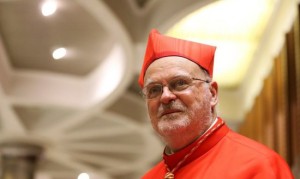 “It surprises me that the topic hasn’t been discussed that much. In Sweden, we have many mixed marriages. But most Catholics aren’t married to practicing Protestants. It is not an issue for us. Of course there are evangelical Christians who would like to receive Communion, but most are non-religious.
“It surprises me that the topic hasn’t been discussed that much. In Sweden, we have many mixed marriages. But most Catholics aren’t married to practicing Protestants. It is not an issue for us. Of course there are evangelical Christians who would like to receive Communion, but most are non-religious.
Of course, the ideal would be that the entire Church is able to arrive at a common solution, but it is difficult: in one country, the situation is thus, in the other it is different. Hopefully, we will one day be able to find a common solution with the entire Church.”
This is exactly what Cardinal Woelki has also said: it is not up to the German bishops alone to decide upon matters that are so essential to the Catholic faith and the understanding of the sacraments. Rather, the entire Church as a whole must decide upon it, if only to avoid the situation in which a regulation is valid in one place and not in another: the Church is not a national Church, but universal, and her sacraments and faith are not bound by borders.
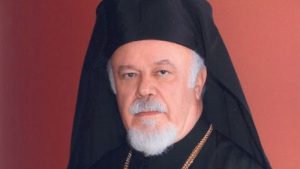 Greek-Orthodox Metropolitan Augoustinos, who hosted Cardinal Woelki in Bonn for the annual plenary meeting of the Greek-Orthodox Church in Germany, expressed himself in similar words after indicating that his church is also following the debate closely. He referred to the Orthodox principle of Oikonomia, which indicates that a regulation can be ignored or a rule broken when it serves the salvation of the person involved. But he then quoted Ecumenical Patriarch Bartholomew I, saying: “As soon as one defines the conditions under which Oikonomia can be applied, Oikonomia itself becomes a rule or regulation.”
Greek-Orthodox Metropolitan Augoustinos, who hosted Cardinal Woelki in Bonn for the annual plenary meeting of the Greek-Orthodox Church in Germany, expressed himself in similar words after indicating that his church is also following the debate closely. He referred to the Orthodox principle of Oikonomia, which indicates that a regulation can be ignored or a rule broken when it serves the salvation of the person involved. But he then quoted Ecumenical Patriarch Bartholomew I, saying: “As soon as one defines the conditions under which Oikonomia can be applied, Oikonomia itself becomes a rule or regulation.”
Cardinal Woelki has spoken about the unwritten rule that a non-Catholic presenting himself for Communion is not turned away: a pastoral exception to the rule which, however, must not be made into a rule itself. That would “endanger the values that must be preserved with special care”. These values would include the Catholic (and, for that matter, Orthodox) doctrine about the Eucharist and Communion.
In an interview for Katholisch.de, Bishop Stefan Oster of Passau also spoke about this point in the debate. He was also one of the seven signatories of the letter to Rome which questioned if the pastoral outreach did not transcend the authority of the German bishops. The bishop explains:
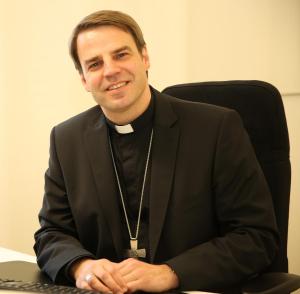 “It is right that we do not turn anyone away from the Communion bench. At that moment no judgement can be made about the discernment of conscience of the individual receiving. I can’t ‘expose’ anyone then. But when we take our understanding of the Eucharist seriously, there can be no superficial practice of giving Communion to just anyone. Therefore, as the priest giving Communion, I am obliged to offer people, at a suitable occasion, personal and spiritual guidance – and explain our understanding of the Eucharist more deeply. And yes, the praxis of individual pastoral care can indeed lead to singular and temporary situations. But in my opinion an official regulation of such exceptions can make it even more likely for such exceptions to become the rule. The current debate already shows that. It is basically less about the “serious spiritual need of individuals,” and more about the interdenominational marriages in general.”
“It is right that we do not turn anyone away from the Communion bench. At that moment no judgement can be made about the discernment of conscience of the individual receiving. I can’t ‘expose’ anyone then. But when we take our understanding of the Eucharist seriously, there can be no superficial practice of giving Communion to just anyone. Therefore, as the priest giving Communion, I am obliged to offer people, at a suitable occasion, personal and spiritual guidance – and explain our understanding of the Eucharist more deeply. And yes, the praxis of individual pastoral care can indeed lead to singular and temporary situations. But in my opinion an official regulation of such exceptions can make it even more likely for such exceptions to become the rule. The current debate already shows that. It is basically less about the “serious spiritual need of individuals,” and more about the interdenominational marriages in general.”
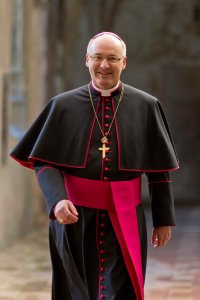
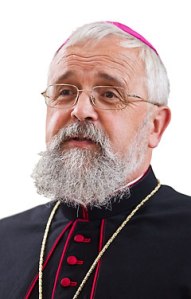 Opposing the actions of the seven bishops is Bishop Gerhard Feige, bishop of Magdeburg and president of the ecumenism commission of the German Bishops’ Conference. In a contribution to Der Zeit last Thursday, Msgr. Feige stated that not taking the chance to help people deepen the joy of the faith and their participation in the Eucharist, as well as promoting ecumenical encounters and strengthening the marriage bond would be “macabre and shameful”. Contrary to other bishops, Msgr. Feige insists that the pastoral outreach exists within modern theological and legal possibilities, referring to the canon law paragraphs which allow local bishops to decide under which circumstances non-Catholic can receive Communion. These circumstances, however, are emergency situations in which the danger of death and the unavailability of ministers of a person’s own denomination play key roles.
Opposing the actions of the seven bishops is Bishop Gerhard Feige, bishop of Magdeburg and president of the ecumenism commission of the German Bishops’ Conference. In a contribution to Der Zeit last Thursday, Msgr. Feige stated that not taking the chance to help people deepen the joy of the faith and their participation in the Eucharist, as well as promoting ecumenical encounters and strengthening the marriage bond would be “macabre and shameful”. Contrary to other bishops, Msgr. Feige insists that the pastoral outreach exists within modern theological and legal possibilities, referring to the canon law paragraphs which allow local bishops to decide under which circumstances non-Catholic can receive Communion. These circumstances, however, are emergency situations in which the danger of death and the unavailability of ministers of a person’s own denomination play key roles.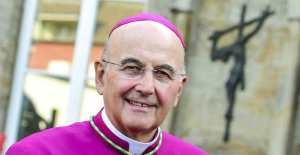 Münster’s Bishop Felix Genn is hopeful of finding a consensus. While the way in which the seven bishops expressed their difficulties with the conference’s vote did not make him happy, he understands their questions of conscience. In an interview for WDR radio Bishop Genn expressed his happiness about the way in which the standing council of the bishops’ conference discussed the issue last week. And although he would have preferred that the seven bishops had first informed the others about their letter before sending it, Bishop Genn’s attitude is perhaps the most consensus-minded in the delegation, which may be a reason for his inclusion. The bishop, for his part, simply thought of his mother’s motto when hearing about being included in the delegation: “One has never got enough work to do.”
Münster’s Bishop Felix Genn is hopeful of finding a consensus. While the way in which the seven bishops expressed their difficulties with the conference’s vote did not make him happy, he understands their questions of conscience. In an interview for WDR radio Bishop Genn expressed his happiness about the way in which the standing council of the bishops’ conference discussed the issue last week. And although he would have preferred that the seven bishops had first informed the others about their letter before sending it, Bishop Genn’s attitude is perhaps the most consensus-minded in the delegation, which may be a reason for his inclusion. The bishop, for his part, simply thought of his mother’s motto when hearing about being included in the delegation: “One has never got enough work to do.” Kerknet, the website of the Catholic Church in Flanders, features
Kerknet, the website of the Catholic Church in Flanders, features  The whole debate about nullification or dissolution of a marriage is an intricate one, and it should always be reminded that a marriage can not be nullified. It can only be established that it was null from the very beginning, to the effect that there never was a marriage to begin with. The reasons for this are many, but for the purpose of this blog posts it suffices to say that they establish the validity of the marriage. One of the most convincing for those outside the world of canon law and ecclesiastical courts is perhaps that a marriage must be entered into out of free will; there can be no coercion, for any reason. If someone was forced into a marriage, it can be established that the marriage was null, that it never existed.
The whole debate about nullification or dissolution of a marriage is an intricate one, and it should always be reminded that a marriage can not be nullified. It can only be established that it was null from the very beginning, to the effect that there never was a marriage to begin with. The reasons for this are many, but for the purpose of this blog posts it suffices to say that they establish the validity of the marriage. One of the most convincing for those outside the world of canon law and ecclesiastical courts is perhaps that a marriage must be entered into out of free will; there can be no coercion, for any reason. If someone was forced into a marriage, it can be established that the marriage was null, that it never existed. Pope Francis recently declared that the date of 1 September would from now on be the World Day of Prayer for the Care of Creation. The Dutch bishops followed suit and called for all fatheful and people of good will to pray for the protection of and care for creation. Not only does this emphasise the place of humanity, and especially Catholic Christians, in the whole of creation, but it also sheds a light on the ecumenical priorities of Pope Francis.
Pope Francis recently declared that the date of 1 September would from now on be the World Day of Prayer for the Care of Creation. The Dutch bishops followed suit and called for all fatheful and people of good will to pray for the protection of and care for creation. Not only does this emphasise the place of humanity, and especially Catholic Christians, in the whole of creation, but it also sheds a light on the ecumenical priorities of Pope Francis. In a recent interview, Bishop Franz-Josef Bode of Osnabrück, one of three German delegates to the Synod of Bishops, has said that the debate is not just about singular questions on marriage and family, but about the fundamental decision on how to face the developments in Europe and the world.
In a recent interview, Bishop Franz-Josef Bode of Osnabrück, one of three German delegates to the Synod of Bishops, has said that the debate is not just about singular questions on marriage and family, but about the fundamental decision on how to face the developments in Europe and the world. 
 Yesterday the Holy See published the list of participants in the upcoming Synod of Bishops on the family. Of course, there are the usual suspects: the heads of the Roman Curia departments, the standing members of the Synod and the presidents of the world’s bishops’ conferences, with the latter being default participants in an Extraordinary General Synod, which this one is. Pope Francis has had a personal touch in the selection of several participants; noteable among those are Cardinal Kasper, to all appearances a theologian much appreciated by the Holy Father, but also the vast majority of cardinals he created in his first consistory of last February.
Yesterday the Holy See published the list of participants in the upcoming Synod of Bishops on the family. Of course, there are the usual suspects: the heads of the Roman Curia departments, the standing members of the Synod and the presidents of the world’s bishops’ conferences, with the latter being default participants in an Extraordinary General Synod, which this one is. Pope Francis has had a personal touch in the selection of several participants; noteable among those are Cardinal Kasper, to all appearances a theologian much appreciated by the Holy Father, but also the vast majority of cardinals he created in his first consistory of last February. From a local point of view it is interesting to see that no less than four participants come from Belgium, while there is only a single one from the Netherlands and a mere two from Germany. Belgium sends Archbishop André-Joseph Léonard,which was expected as he is the president of the Belgian bishops’ conference, but also his predecessor, Cardinal Godfried Danneels (pictured), as well as Father George Henri Ruyssen of the Pontifical Oriental Institute in Rome. Additionaly, Metropolitan Athenagoras, the head of the Russian Orthodox Church in Belgium, attends as a “fraternal delegate”.
From a local point of view it is interesting to see that no less than four participants come from Belgium, while there is only a single one from the Netherlands and a mere two from Germany. Belgium sends Archbishop André-Joseph Léonard,which was expected as he is the president of the Belgian bishops’ conference, but also his predecessor, Cardinal Godfried Danneels (pictured), as well as Father George Henri Ruyssen of the Pontifical Oriental Institute in Rome. Additionaly, Metropolitan Athenagoras, the head of the Russian Orthodox Church in Belgium, attends as a “fraternal delegate”. Three weeks before the first Francis-style consistory, a look at exactly what titles the new cardinals may be receiving. As always, it’s a guessing game, but an interesting one, which sheds a light on how the cardinals of the world Church are a part of the local Church of Rome, symbolising their unity with the See of Peter.
Three weeks before the first Francis-style consistory, a look at exactly what titles the new cardinals may be receiving. As always, it’s a guessing game, but an interesting one, which sheds a light on how the cardinals of the world Church are a part of the local Church of Rome, symbolising their unity with the See of Peter. Most of these deaconries fell vacant only recently, with the exception of San Teodoro (since 2000), San Giovanni Battista Decollato (since 1988) and Santa Maria in Cosmedin (since 1967) (pictured). Assigning these three would be high time, then. San Teodoro, however, is used by the Greek Orthodox community in Rome, after Pope John Paul II granted them its use in 2000. Keeping this deaconry vacant would be a sign of good will that Pope Francis may well want to to extend.
Most of these deaconries fell vacant only recently, with the exception of San Teodoro (since 2000), San Giovanni Battista Decollato (since 1988) and Santa Maria in Cosmedin (since 1967) (pictured). Assigning these three would be high time, then. San Teodoro, however, is used by the Greek Orthodox community in Rome, after Pope John Paul II granted them its use in 2000. Keeping this deaconry vacant would be a sign of good will that Pope Francis may well want to to extend.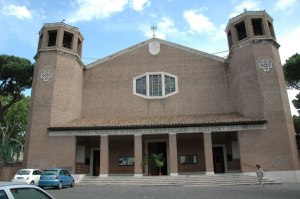 First of all, this list contains Pope Francis’ own Cardinal Title of San Roberto Bellarmino (pictured), which he held until his election to the papacy. Maybe he’ll choose to keep to the pattern of that title being held by South American prelates, and he could even grant it to his own successor in Buenos Aires, Mario Poli. All these titles fell vacant in the past four years, so none is really in need of being filled immediately (if titles can ever be, of course). San Crisogono and Santa Maria in Trastevere are two of the oldest titles, dating back to the second century.
First of all, this list contains Pope Francis’ own Cardinal Title of San Roberto Bellarmino (pictured), which he held until his election to the papacy. Maybe he’ll choose to keep to the pattern of that title being held by South American prelates, and he could even grant it to his own successor in Buenos Aires, Mario Poli. All these titles fell vacant in the past four years, so none is really in need of being filled immediately (if titles can ever be, of course). San Crisogono and Santa Maria in Trastevere are two of the oldest titles, dating back to the second century. One day before his 80th birthday, and his retirement from Curial functions that comes with it, Cardinal Joachim Meisner makes some bold and critical statements in
One day before his 80th birthday, and his retirement from Curial functions that comes with it, Cardinal Joachim Meisner makes some bold and critical statements in